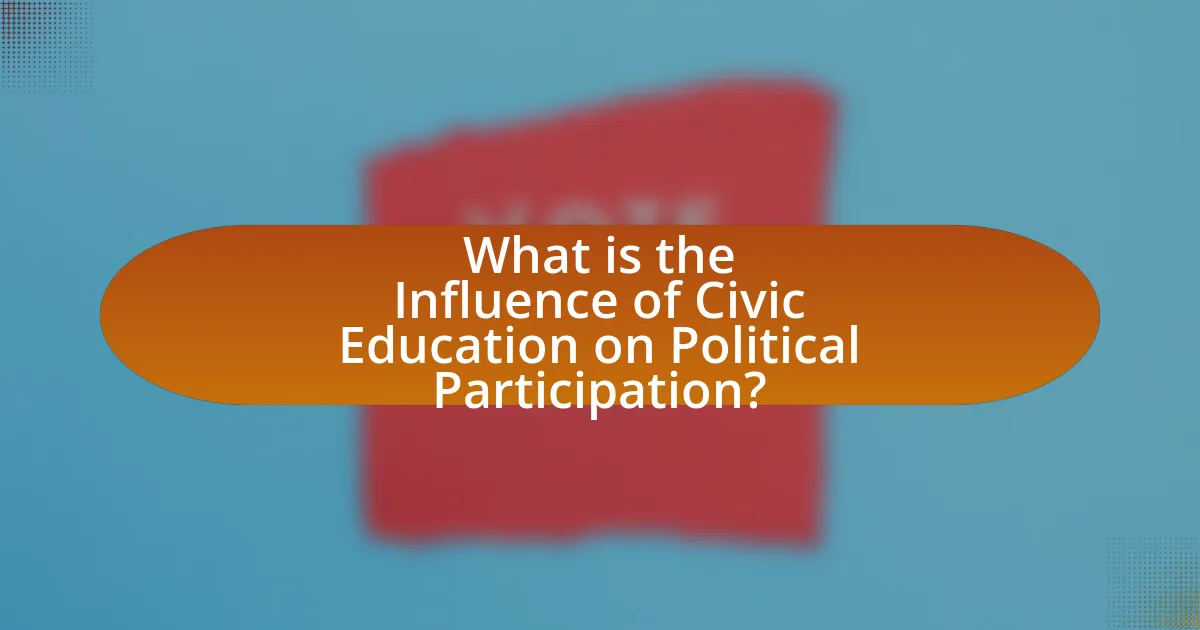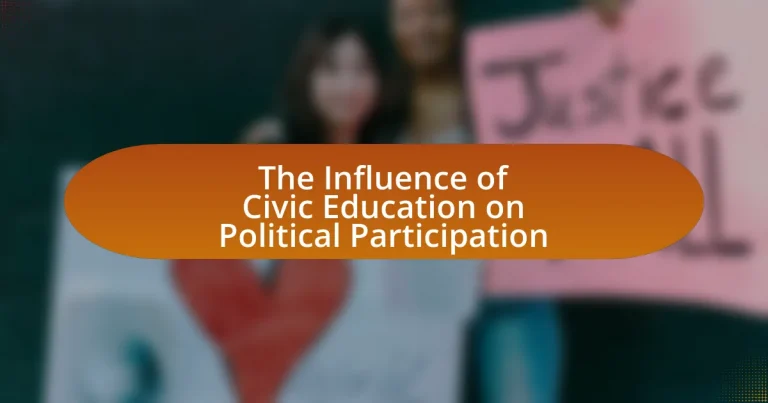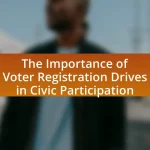Civic education plays a crucial role in enhancing political participation by equipping individuals with the necessary knowledge and skills to engage in democratic processes. Research shows that those who receive civic education are significantly more likely to vote, participate in community service, and engage in political discussions. Key components of effective civic education include curriculum content, pedagogical approaches, and experiential learning opportunities, all of which contribute to increased political awareness and engagement. The article explores the impact of civic education on youth political engagement, the challenges it faces, and strategies for improvement, emphasizing its essential role in fostering informed and active citizens within a functioning democracy.

What is the Influence of Civic Education on Political Participation?
Civic education significantly enhances political participation by equipping individuals with the knowledge and skills necessary to engage in democratic processes. Research indicates that individuals who receive civic education are more likely to vote, participate in community service, and engage in political discussions. For instance, a study by the Center for Information and Research on Civic Learning and Engagement (CIRCLE) found that high school students who participated in civic education programs were 20% more likely to vote in subsequent elections compared to their peers who did not receive such education. This correlation underscores the role of civic education in fostering informed and active citizens, thereby increasing overall political engagement.
How does civic education shape political awareness among citizens?
Civic education shapes political awareness among citizens by providing them with the knowledge and skills necessary to understand political systems and engage in civic activities. This educational framework equips individuals with an understanding of their rights and responsibilities, the functioning of government, and the importance of participation in democratic processes. Research indicates that students who receive comprehensive civic education are more likely to vote and participate in community activities, as evidenced by a study conducted by the Center for Information and Research on Civic Learning and Engagement, which found that civic education significantly increases the likelihood of youth voting by 20%. This correlation demonstrates that informed citizens are more engaged and aware of political issues, leading to a more active and participatory democracy.
What are the key components of civic education that impact political knowledge?
The key components of civic education that impact political knowledge include curriculum content, pedagogical approaches, and experiential learning opportunities. Curriculum content encompasses the study of government structures, political processes, and civic responsibilities, which provides foundational knowledge essential for understanding political systems. Pedagogical approaches, such as critical thinking and discussion-based learning, encourage students to engage with political issues actively, fostering analytical skills necessary for informed citizenship. Experiential learning opportunities, like community service and simulations of democratic processes, enhance practical understanding and application of political concepts. Research indicates that students exposed to comprehensive civic education are more likely to demonstrate higher levels of political knowledge and engagement, as evidenced by studies showing that civic education correlates with increased voter turnout and civic participation rates.
How does increased political awareness lead to higher participation rates?
Increased political awareness leads to higher participation rates by empowering individuals with knowledge about their rights, responsibilities, and the political process. When citizens understand the significance of their vote and the impact of policies on their lives, they are more likely to engage in activities such as voting, attending town hall meetings, and advocating for issues. Research indicates that individuals who receive civic education are 20% more likely to participate in elections compared to those who do not, as evidenced by studies conducted by the Center for Information & Research on Civic Learning and Engagement. This correlation demonstrates that informed citizens are more motivated to take part in democratic processes, thereby enhancing overall civic engagement.
Why is civic education essential for a functioning democracy?
Civic education is essential for a functioning democracy because it equips citizens with the knowledge and skills necessary to engage effectively in the political process. This education fosters an understanding of democratic principles, rights, and responsibilities, enabling individuals to make informed decisions and participate actively in governance. Research indicates that individuals who receive civic education are more likely to vote, engage in community service, and advocate for social change, thereby strengthening democratic institutions. For instance, a study by the Center for Information and Research on Civic Learning and Engagement found that students who participated in civic education programs were significantly more likely to vote in elections compared to their peers who did not receive such education. This correlation underscores the critical role of civic education in promoting political participation and sustaining a vibrant democracy.
What role does civic education play in fostering informed citizens?
Civic education plays a crucial role in fostering informed citizens by equipping them with the knowledge and skills necessary to engage effectively in democratic processes. This education informs individuals about their rights, responsibilities, and the functioning of government, which enhances their ability to make informed decisions. Studies, such as those conducted by the Center for Information & Research on Civic Learning and Engagement, show that students who receive civic education are more likely to participate in political activities, such as voting and community service, thereby demonstrating the direct impact of civic education on political engagement and informed citizenship.
How does civic education contribute to the development of civic virtues?
Civic education contributes to the development of civic virtues by instilling knowledge, skills, and values essential for active participation in democratic processes. Through structured curricula, civic education teaches individuals about their rights and responsibilities, fostering a sense of community and encouraging civic engagement. Research indicates that students who receive civic education are more likely to exhibit civic virtues such as tolerance, respect for diversity, and a commitment to the common good. For instance, a study by the Center for Information and Research on Civic Learning and Engagement found that high school students who participated in civic education programs demonstrated higher levels of civic engagement and a greater understanding of democratic principles. This evidence underscores the critical role of civic education in shaping responsible citizens who contribute positively to society.
What are the different forms of civic education available?
Different forms of civic education include formal education, non-formal education, and informal education. Formal education typically occurs in schools and universities, where structured curricula teach students about government, rights, and responsibilities. Non-formal education encompasses community programs, workshops, and seminars that aim to engage citizens in civic issues outside traditional school settings. Informal education occurs through everyday experiences, such as discussions with family and friends, media consumption, and participation in community activities. Each form plays a crucial role in enhancing civic knowledge and fostering political participation among individuals.
What types of civic education programs exist in schools?
Civic education programs in schools typically include service-learning programs, classroom-based civic instruction, extracurricular activities focused on civic engagement, and simulations of democratic processes. Service-learning programs integrate community service with academic learning, allowing students to engage with their communities while developing civic skills. Classroom-based civic instruction provides students with knowledge about government, rights, and responsibilities, often aligned with state standards. Extracurricular activities, such as debate clubs or student government, encourage active participation in civic life. Simulations, like mock elections or model United Nations, offer practical experiences in governance and diplomacy. These programs collectively aim to enhance students’ understanding of civic responsibilities and promote active political participation.
How do community-based civic education initiatives differ from formal education?
Community-based civic education initiatives differ from formal education primarily in their approach and context. Community-based initiatives focus on practical engagement and local issues, fostering active participation in civic life, while formal education typically emphasizes standardized curricula and theoretical knowledge. For instance, community programs often involve hands-on activities like town hall meetings or local advocacy, which directly connect participants to their communities, whereas formal education may prioritize classroom learning and examinations. This distinction highlights how community-based initiatives can enhance political participation by making civic engagement more relevant and accessible to individuals in their everyday lives.
How does civic education influence youth political engagement?
Civic education significantly enhances youth political engagement by equipping young individuals with the knowledge and skills necessary to participate in democratic processes. Research indicates that students who receive comprehensive civic education are more likely to vote, engage in community service, and discuss political issues, as evidenced by a study from the Center for Information and Research on Civic Learning and Engagement, which found that civic education increases the likelihood of voting among young people by 20%. This educational framework fosters critical thinking, encourages active citizenship, and instills a sense of responsibility, ultimately leading to higher levels of political participation among youth.
What specific strategies can be employed to engage young people in civic education?
To engage young people in civic education, interactive and experiential learning strategies should be employed. These strategies include project-based learning, where students participate in community service projects that address local issues, fostering a sense of responsibility and connection to their community. Research indicates that students involved in service-learning programs demonstrate increased civic knowledge and engagement, as evidenced by a study from the National Youth Leadership Council, which found that 85% of participants reported a greater understanding of civic responsibilities. Additionally, incorporating technology and social media platforms can enhance engagement, as young people are more likely to connect with civic content through familiar digital channels. This approach aligns with findings from the Pew Research Center, which shows that 95% of teens have access to smartphones, making digital engagement a crucial strategy for reaching this demographic effectively.
How does early exposure to civic education affect lifelong political participation?
Early exposure to civic education significantly enhances lifelong political participation. Research indicates that individuals who receive civic education during their formative years are more likely to engage in voting, community service, and political discussions as adults. For instance, a study by the Center for Information and Research on Civic Learning and Engagement (CIRCLE) found that students who participated in civic education programs were 20% more likely to vote in their first election compared to those who did not receive such education. This correlation suggests that early civic education fosters a sense of civic responsibility and equips individuals with the knowledge and skills necessary for active participation in democratic processes.
What challenges does civic education face in promoting political participation?
Civic education faces several challenges in promoting political participation, primarily including a lack of engagement, insufficient resources, and varying educational standards. The lack of engagement arises when students perceive civic education as irrelevant to their lives, leading to disinterest in political processes. Insufficient resources, such as funding and trained educators, hinder the effective delivery of civic education programs, limiting their reach and impact. Additionally, varying educational standards across regions result in inconsistent quality of civic education, which can lead to disparities in political knowledge and participation among students. Research indicates that states with robust civic education requirements see higher levels of political engagement among young voters, highlighting the importance of addressing these challenges to enhance civic education’s effectiveness.
How do socioeconomic factors impact access to civic education?
Socioeconomic factors significantly impact access to civic education by creating disparities in resources, opportunities, and engagement levels among different social groups. Individuals from lower socioeconomic backgrounds often face barriers such as inadequate funding for schools, limited access to educational materials, and fewer extracurricular programs focused on civic engagement. For instance, a study by the National Center for Education Statistics found that schools in low-income areas receive substantially less funding than those in affluent neighborhoods, leading to a lack of comprehensive civic education programs. This inequity results in reduced awareness and understanding of civic rights and responsibilities, ultimately affecting political participation rates among these populations.
What are the barriers to effective civic education in diverse communities?
Barriers to effective civic education in diverse communities include language differences, cultural misunderstandings, and socioeconomic disparities. Language differences hinder communication and comprehension of civic concepts, making it difficult for non-native speakers to engage fully. Cultural misunderstandings can lead to misinterpretations of civic values and practices, reducing the relevance of educational content. Socioeconomic disparities often limit access to quality educational resources and opportunities, resulting in unequal civic knowledge and participation. Research indicates that these factors collectively diminish the effectiveness of civic education programs, as evidenced by studies showing lower political engagement among marginalized groups due to these barriers.
How can civic education be improved to enhance political participation?
Civic education can be improved to enhance political participation by integrating experiential learning opportunities that engage students in real-world political processes. Research indicates that programs involving simulations, debates, and community service increase students’ understanding of civic responsibilities and their likelihood of participating in elections. For instance, a study by the Center for Information and Research on Civic Learning and Engagement found that students who participated in civic education programs that included hands-on activities were 50% more likely to vote in subsequent elections compared to those who received traditional instruction. This evidence supports the notion that active engagement in civic education fosters a deeper connection to political processes, ultimately leading to higher rates of political participation.
What best practices can be adopted for effective civic education programs?
Effective civic education programs should incorporate experiential learning, community engagement, and critical thinking skills. Experiential learning, such as simulations of democratic processes, allows participants to actively engage with civic concepts, enhancing retention and understanding. Community engagement fosters a sense of responsibility and connection to local issues, encouraging participants to apply their knowledge in real-world contexts. Additionally, promoting critical thinking equips individuals to analyze information and make informed decisions, which is essential for active political participation. Research indicates that programs employing these methods significantly increase civic knowledge and participation rates among participants, demonstrating their effectiveness in fostering informed and engaged citizens.
How can technology be leveraged to enhance civic education outreach?
Technology can be leveraged to enhance civic education outreach by utilizing digital platforms to disseminate information and engage citizens. Online resources such as interactive websites, social media campaigns, and mobile applications can provide accessible civic education materials, reaching a broader audience. For instance, a study by the Pew Research Center found that 73% of adults use social media, making it an effective channel for promoting civic engagement initiatives. Additionally, virtual reality experiences can simulate civic processes, allowing users to understand the importance of participation in a more immersive way. These technological tools not only increase awareness but also foster active participation in democratic processes, thereby strengthening civic education outreach.
What practical steps can individuals take to promote civic education in their communities?
Individuals can promote civic education in their communities by organizing workshops and discussion groups focused on civic responsibilities and rights. These initiatives can enhance understanding of local governance, electoral processes, and civic engagement. Research indicates that communities with active civic education programs see higher voter turnout and participation in local governance, as evidenced by a study from the National Civic League, which found that civic education initiatives increased civic engagement by 20% in participating communities. Additionally, individuals can collaborate with local schools to integrate civic education into the curriculum, ensuring that students receive foundational knowledge about their rights and responsibilities as citizens.


